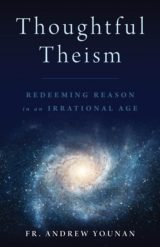By Fr. Andrew Younan
Fr. Andrew Younan is a priest of the Chaldean Catholic Church. He has translated much of the Chaldean liturgy from Aramaic into English. He teaches at John Paul the Great Catholic University. Fr. Younan is the author of Thoughtful Theism: Redeeming Reason in an Irrational Age.

There are many different questions that need to be asked about God, and they are all distinct from each other. People fall into logical black holes when they fail to understand this simple point. Proving that God exists is not at all the same as proving that he (assuming this is the proper pronoun to use) is omnipotent, or omniscient, or good, or even that there is one of him. These are all completely different questions, whose arguments may or may not be related. If I attempt to prove that God exists, that argument should be examined according to what it is attempting to do, not anything else. If that argument does not prove that there is one God, or that God is all-powerful, or anything else, that is not a problem. It never attempted to prove those things, and it is either confused or dishonest to pretend that it did, or that there is a problem with the proof because it doesn’t prove everything all at once. Anyone attempting a true examination of this question must face this reality honestly.
Unfortunately, there are many who don’t. I quote the most popular of the New Atheism authors, Richard Dawkins, as an example. In his treatment of Thomas Aquinas’s Five Proofs in The God Delusion, Dawkins makes this statement:
“Even if we allow the dubious luxury of arbitrarily conjuring up a terminator to an infinite regress and giving it a name, simply because we need one, there is absolutely no reason to endow that terminator with any of the properties normally ascribed to God: omnipotence, omniscience, goodness, creativity of design, to say nothing of such human attributes as listening to prayers, forgiving sins and reading innermost thoughts.
I agree completely with Richard Dawkins. Thomas’s proofs for God’s existence give us “absolutely no reason” to believe that God is omnipotent, omniscient, good, or anything else. But they were nevermeant to give us any reason for any of those things, though they might imply them, or develop into other arguments about them later. St. Thomas’s Five Ways only attempt to prove that God exists. Nothing more than that—certainly nothing related to prayer or forgiveness, which are questions related to “revealed” religion and to supernatural theology, not at all to philosophy.
This point, that each of these questions is separate, is easily illustrated by glancing at the titles for the first handful of “Questions” of the Summa Theologica of Thomas Aquinas:
- The Existence of God
- The Simplicity of God
- The Perfection of God
Each of these “Questions” (and they continue for thousands of pages) contains several “Articles,” wherein each question is broken down into even smaller pieces. Then within each “Article,” several “Objections” are first brought up from opposing viewpoints, so that as much as possible no argument is neglected. This is how a careful thinker proceeds. Richard Dawkins dismisses Thomas Aquinas after four pages, using arguments like the one I quoted above (as you will see in the next chapter). Before him, Bertrand Russell is honest enough to admit what he’s doing: “To come to this question of the existence of God: it is a large and serious question, and if I were to attempt to deal with it in any adequate manner I should have to keep you here until Kingdom Come, so that you will have to excuse me if I deal with it in a somewhat summary fashion.”
“There is absolutely no reason to endow that terminator with any of the properties normally ascribed to God . . .” This is either a serious misunderstanding by Professor Dawkins or a serious deception. It is not my business to judge which it is, but the fact remains that, at what I would argue is the critical moment in his book (his examination of the strongest proofs for God’s existence), Dawkins makes an enormous logical blunder, and builds the rest of the argument of his book on this blunder. This is a shaky foundation, and I am saddened to think of the thousands of people who have claimed to have abandoned their belief in God because of his books when this is the kind of reasoning representative of his thought.
This logical glitch is also representative of the intellectual laziness I discussed earlier, though it is certainly not limited to atheists. Where there are many questions to ask, we would be tempted to reduce them to only one. But that will get us nowhere. Someone taking the question seriously would break the questions down into the smallest logical units possible and answer one at a time, in the most logical order. More thoughtful atheists do this quite well, of course. They ask whether there is a God, and conclude that the answer is no. After that, there’s no reason to ask whether God is all-powerful, or all-knowing, or good, or bad, or anything else. Nor is there any reason to even begin asking which religion might be “the right one,” if there is no God. This is all quite reasonable. The question that is the topic of this book is that first one—is there a God? I will not attempt to answer any other question in this book, since this is the first and biggest one to ask. Once it is answered satisfactorily, then someone might move on to the next question, whatever that might be.
You Might Also Like

Thoughtful Theism: Redeeming Reason in an Irrational Age is more than a defense of the existence of God. It is an attempt to remind us that belief in God is at its root rational. Drawing from years of experience as a priest and a teacher of philosophy, Fr. Younan presents the fallacies that often accompany thinking about a concept as difficult as God.